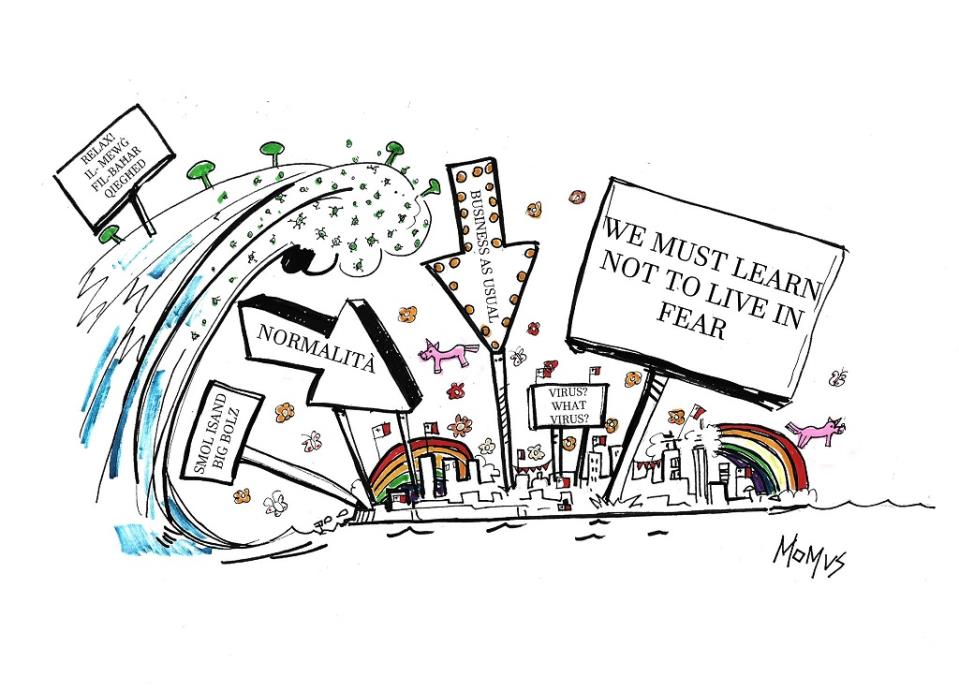What is "the new normal"? If there were a simple answer to that question, then we would be cutting across a lot of trouble. Business leaders and politicians are trying to predict the way the cards are currently falling. In this unprecedented global pandemic, our economies are coming under strain not seen since the World Wars.
Many recognise this destruction as being an opportunity to try and change the world for the better once we get about rebuilding it. Environmentalists in particular dream that this might serve as a wake-up call about climate change - because the kind of devastation that it will cause will be far worse than COVID-19 if we continue to do nothing.
Others just want to get back to business as usual as quickly as possible, oblivious to the larger lessons being learned by many during this difficult time. In this competitive global economy in a time of great crisis, it is difficult to predict where the chips will ultimately fall. We can, however, have a quick look across the current landscape to get an idea of the direction we are headed, while bearing in mind the danger of a second wave of illness upsetting everyone's plans.
In terms of the environment, my initial hopes had been that this crisis would lead to a massive drop in global emissions. Before the COVID-19 pandemic of 2020, emissions of carbon dioxide were rising by about 1% per year over the past decade. While it is difficult to estimate the total decrease in daily fossil CO2 emissions due to forced confinement of the pandemic, one study guesses that by year's end the annual decrease will be between 4.2 to 7.5%, as economies are expected to re-open.

This rate is comparable to the rates of decrease needed every single year over the next decades to limit climate change to a 1.5 °C warming, as agreed by the Paris Climate Accord. Therefore, the impact of individual behaviour as seen in this pandemic demonstrates the limitations of what an individual can do via his or her lifestyle. It shows that governments and corporations bear the ultimate responsibility in lowering global emissions, since the pandemic has had such a limited impact on emissions in the big picture.
In the meanwhile, Brazil and other dodgy governments have taken advantage of the pandemic to launch assaults on the environment. The rate of deforestation in the Amazon has soared over the past months. Consider our chances of surviving climate change if, along with the continued irresponsible use of fossil fuels, we destroy the Amazon.
China, in the meanwhile, has taken advantage of the pandemic to launch an attack on Hong Kong's autonomy. Given the escalating diplomatic crisis between China and the United States, it is possible that China is re-assessing its strategic approach, and rather than seek reconciliation and solutions through dialogue, it is ready to carry a bigger stick. Its rhetoric with Taiwan continues to raise concerns for peace in the region, as Taiwan increasingly rejects the notion of ever allowing itself to be ruled by the mainland. Will the rift between China and the West grow, as the United States continues to blame China for the pandemic, and engage in an ongoing trade war?
What of the feared second wave of coronavirus, and its implications? Closer to home, debate rages regarding when the airport should be re-opened, as Malta's economy stands on a precipice. Whether the airport is reopened in June or July, however, the stark reality is that there are tough times ahead. The rate of tourism and business to which we are accustomed is out of reach for the foreseeable future. We were to open our borders tomorrow, we are still facing the looming threat of mass unemployment and businesses going bankrupt. Who will have money to spend on a holiday, and who will even want to go for a holiday for a while to come, especially as air routes are decimated? Amidst these troubles, landlords have an obligation not to milk businesses to death, which would come to their own detriment in the long run and potentially force heavy handed intervention.
At this delicate time, Malta must engage with our European partners to coordinate economic recovery, ensuring that best practices are implemented while our economies open up again so as to prevent a second wave of infection. We must follow the examples of countries which have beaten COVID-18 such as South Korea, using technology and innovation to do so. In this way, we can open up our economies while minimizing the threat of a second wave. Simply ignoring the threat of one will ultimately help nobody.
As for "the new normal" - one thing is clear. In this chaos, every person has been affected in a different and deeply personal way. Whether that is through direct contact with the sickness, or through economic or social hardship, this event has touched us all. Therefore, let us not attempt to predict a standard that will apply to everyone. In planning for resilience, let us expect that "the new normal" is, by its nature, elusive. History and world events are unpredictable at the best of times, as this pandemic itself has shown. What we must focus on, therefore, is where we want to be. Let us consider the kind of world we want to live in tomorrow, and start building it today, now that there is an opportunity. This may likewise be our best opportunity to avert environmental disaster, which will drag us into a crisis from which there may be no return at all.